It’s as Easy as 1, 2…10!
In this article, we will share more about what the coaching cards are, why you should use them, how to use them, and some pitfalls that may come with coaching. We have over 30 decks in our coaching card range so whichever soft skill you’re looking to coach your team on, there’s a deck for you. Check out the full range on our Coaching Card page or our Amazon Store.
What are Coaching Cards?
You will have used playing cards. Ace, King, Queen, etc. for Poker and other card games. Coaching cards are similar in size and feel. The difference is that coaching cards are used by coaches to coach a person to be the best version of themselves.
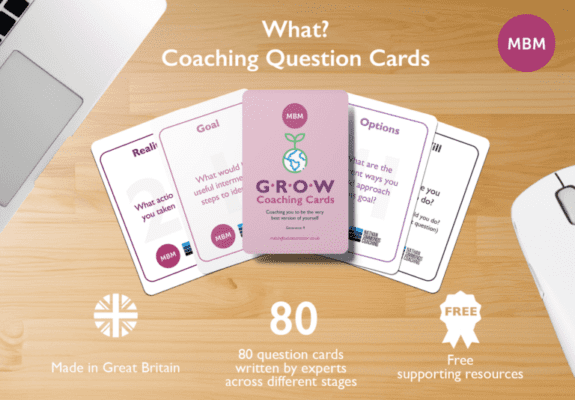
Why Use Coaching Cards?
Don’t accept that you are a line manager who tells. This means that you’ll always tell and probably be very frustrated asking yourself questions like, ‘Why can’t they just think for themselves?’. The answer to this is because why should they think when you solve every query they bring to you, and when they previously tried to do it themselves, they got it wrong, and you told them so.
The alternative is to know that Google created Project Oxygen some years back. This project was all about understanding management performance. They analysed over 10,000 appraisals, performance, and evaluation documents. Their two conclusions were staggering:
- The skill that line managers were worst at? Coaching.
- The skills that line managers needed to be best at? Coaching.
Most line managers have dabbled in coaching but found themselves thinking – ‘I could tell them in half the time’. Yes, you could, but remember the phrase about the man and his fish?
“Give a man a fish and you feed him for a day. Teach a man to fish and you feed him for life.”

If you are always your team’s crutch, their support, then expect that if you continue being so, it will become permanent. A permanent crutch for them to really on. The alternative?
Even if you’ve had no coaching and only have a little idea about what to do with coaching, grab a pack of our coaching cards, and then read, and listen. Let them, the coachee, do all the ‘work’. Your job is to listen 80%, talk 20%, and ask the questions. The coachee has all the answers they need. You just need to help them to find those answers.
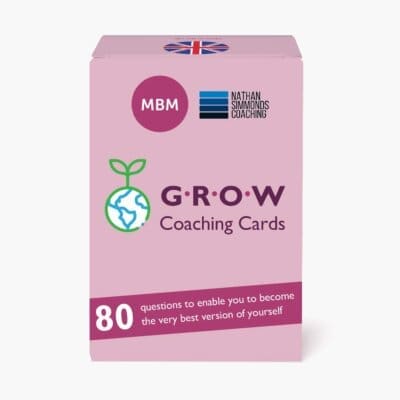
>> Buy a pack of cards today <<
>> View our cards on Amazon <<
How to Use Coaching Cards
Imagine two people in a meeting room. A line manager and one of their team. The team member has been struggling with meeting their goals, and the team member has not met their KPIs for this month. The line manager could simply tell them what they did wrong and what they would do.
However, this particular line manager understands the power of coaching, so they invite the team members to a coaching session next week, where they’ll help them to understand how to set and achieve their goals effectively.
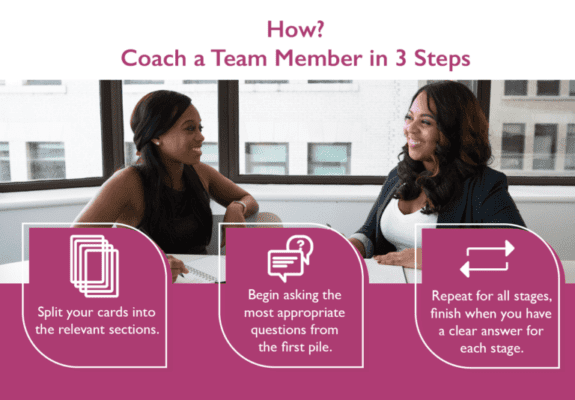
The team member thanks them and agrees. Fast forward a few days, and we are at that meeting – the two of them in the meeting room…
Sitting not opposite, but at a 45-degree angle to each other and ideally not across a table. The line manager selects the GROW coaching cards deck, from the many coaching card decks available. They then follow the instructions:
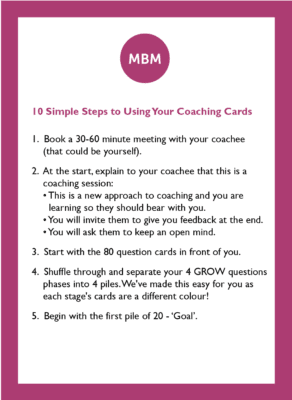
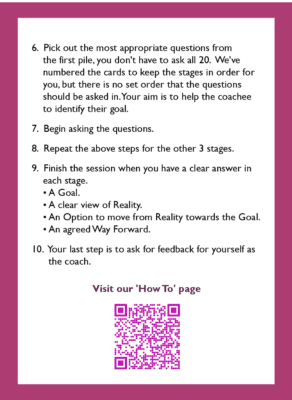
Sticky Learning ® is 7 times more effective than 1-day training courses. Plus, you will get a Chain of Evidence proving your Return on Investment. Discover soft skills training that changes behaviours long term.

10 Simple Steps for How to Use Your Coaching Cards
Steps 1-5
- 1. Book a meeting with your coachee (that could be yourself) for 30-60 minutes.
- 2. At the start of your session explain to your coachee that this is a coaching session:
– They should bear with you as you learn and get used to coaching with the
– You will invite them to give you feedback at the Ask them to keep an open mind.
– There might be some bumps and pauses as this is a new approach to personal development or - 3. Start with the whole deck of 80 cards in front of you.
- 4. Shuffle through and separate your 4 stages into individual piles.
- 5. Begin with the first stage’s, ‘Goal’, coaching cards in your hand.
Steps 6-10
- 6. Pick out the most appropriate questions from these first 20. You do not need to ask all 20 questions, and you do not need to ask them in the order you have found them. Your aim is to help the coachee to think about their goal setting.
- 7. Start asking and see what comes
- 8. Repeat the above steps for the other 3 stages; Reality, Options, and Way Forward.
- 9. Finish the coaching session when the coachee has a clear answer for each stage.
- 10. Your last step is to get some feedback for yourself as the coach.

The Pitfalls of Coaching
You Talk Too Much
Don’t. There is a temptation to tell them the answer. This is telling. There is a temptation to share your experience – this is mentoring. Whilst the purist coaches claim that there should be no telling and no sharing, in moderation, and in the name of helping your coachee to progress, it is ok to do so.
You Feel Foolish
You might. If you feel like this and show it, they will too. Fake it until you make it by at least pretending that you are coaching an Olympic athlete to win a gold medal. Serious business. So, be serious. This is an important session for the coachee because they just messed-up their negotiation and they want your help to help them to find the best version of themselves.
You Struggle with the Model
Whilst John Whitmore came up with an excellent model from coaching – GROW; Goals, Reality, Options, and Way Forward, there are many other models available. Some of our decks follow his model and some follow other models. The point is that whilst the models are good for helping you to follow a roadmap, the only real aim of coaching is to help the coachee to solve their own problems. As long as you achieve this, no cares what model you used.
You Feel like a Fraud
You feel like this because whilst you are their line manager it does not mean that you do all skills better than your team. And that should not be your aim. Your aim is to lead a team effectively, not to do all their jobs better than them. A coach is not a subject matter expert. Below is an image of Usain Bolt’s coach – you see what I mean?!
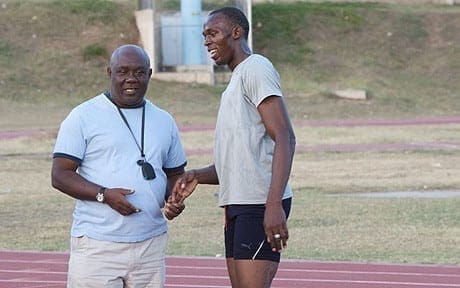
Coaching Resources
To support you further on your coaching journey, we’ve collated some of our best coaching resources for you:




